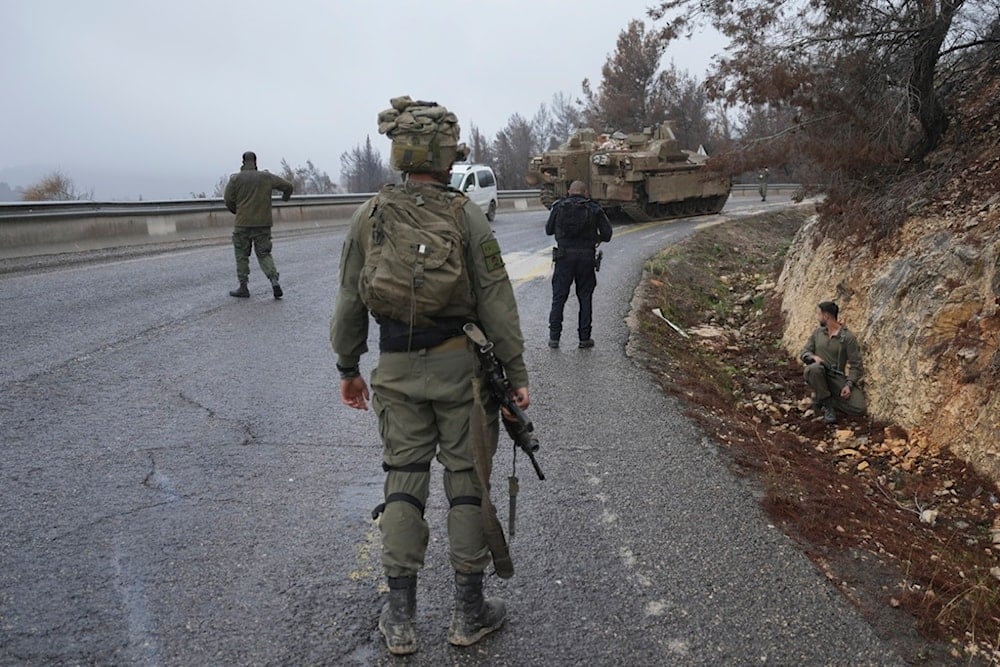War fatigue grips 'Israel' as wars expand, casualties mount: WashPo
Growing numbers of reservists are refusing to report for duty, exacerbating the military's challenges as it struggles to sustain operations in an increasingly expansive regional war.
-

Israeli soldiers stop traffic during an alert of incoming rockets, near "Kiryat Shmona", northern Palestine, Sunday, November 24, 2024. (AP)
As "Israel's" wars on Gaza and Lebanon stretch on, the occupation faces deepening war fatigue, with mounting casualties, economic strain, and widespread disruptions, The Washington Post reports. Reservists, settlers, and businesses are bearing the brunt of a war that shows no signs of abating.
Ari Kraus, a reservist in the Golani Brigade, spends his days in Gaza destroying underground tunnels. His story mirrors that of roughly 80,000 Israeli reservists who have been called away from their families, jobs, and studies to serve on the front lines.
However, growing numbers of reservists are refusing to report for duty, exacerbating the military's challenges as it struggles to sustain operations in an increasingly expansive regional war.
According to Israeli Force spokesperson Nadav Shoshani, recruitment rates have dropped by 15% since October 2023, reflecting the strain on the armed forces.
"We never imagined a war would extend this far or last this long," said one special forces reservist, who reported that his 12-person unit had shrunk to five as others declined to serve. Speaking anonymously due to military protocols, he added, "We also didn't think there would be no one to replace us."
Read more: Settlers in Haifa are now 'on front line', Nahariya became ghost town
Reservists, families struggling under pressure
The impact on reservists and their families is profound. Soldiers share stories of strained marriages, with some spouses threatening divorce over prolonged absences. Employers are growing increasingly impatient, while women left as single mothers have reduced work hours to care for children, causing productivity to plummet across various sectors.
Jael Talshir, a political analyst at the Hebrew University, described the situation as a breaking point for Israeli society.
"Whether it's the economic crisis, the heavy toll on reservists and their families, or the casualties and injuries, Israeli society is certainly nearing the limit of its capacity," she said.
Economic toll
The prolonged war is also taking a significant toll on "Israel's" economy. Benjamin Bental, head of economic policy at the Taub Center for Social Policy Studies in "Israel", noted a 2% decline in economic growth last year, with projections showing a further contraction of 1.5% in 2024.
Small businesses are shutting down, startups are losing capital, and some successful companies are contemplating relocating abroad.
Before the war, an average of 3,200 workers were absent monthly for reserve duty, typically for a few days at a time. However, from October to December last year, this number surged to 130,000 workers per month, most of whom were completely absent.
The ripple effects are evident, with small businesses closing their doors and larger companies grappling with declining output.
Military reforms in response
Israeli forces are reportedly exploring measures to address personnel shortages, including extending mandatory service for regular soldiers and raising the maximum age for reservists. Despite these efforts, many soldiers report feeling pushed to their limits.
"I feel like the government is forcing me to abandon my family for weeks, not for leisure, but for war," said a reservist who has served nearly 300 days this year.
Read more: Israeli settlers living 'endless nightmare' in north: Israeli media

 3 Min Read
3 Min Read








